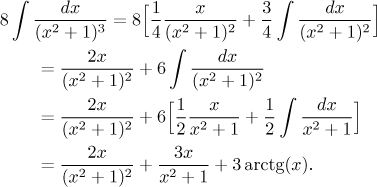Problem: Evaluate the integral
![]()
Solution: This is a rational function, so we face partial fractions. Is there any alternative? Only some substitution, but since the numerator is not close to the derivative of the denominator (check), substitution will not bail us out. Thus we start the standard procedure.
The degree of the numerator is lower than the degree of the denominator and the denominator is already factored, so we go right to the partial fractions decomposition. We have six unknown constants, none of which we get easily as we have no real roots. Thus we need six equations, we will try the universal multiplying method, since it will not be too bad here.

If the multiplying out got tought, one would be tempted to look for alternatives. There are ways to get a few equations somewhat easily but not all six. A curious reader will find a closer look here. Anyway, now we have to integrate

Now we should observe that quadratic expressions in denominators have no linear parts, so we can skip the completion of square step and get right to differentiation. According to recommendation we split those partial fractions into parts with x in numerators and parts without it. We know that integrals with x in the numerator can be easily integrated using a quadratic substitution and the second one is elementary.

The last term cannot be reasonably approached with just common sense and basic integration tools, the standard procedure tells us to look up the reduction formula and apply it. Let's do it.

Now we put it together.
